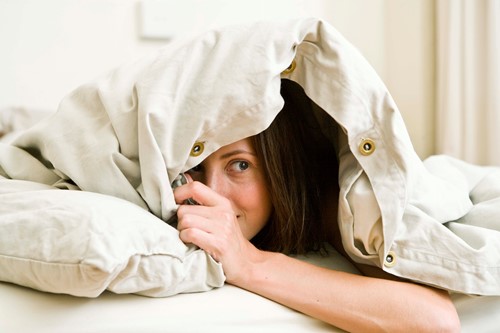Why is it so difficult to get out of bed and what can you do to stop it?
If you think about it, when you were younger, you were the one who bounded into your parent’s bedroom at the crack of dawn to wake them up right? But not anymore… It’s far more likely that your parent’s are the ones dragging you out of bed in the morning. So when did this change occur, why is it so difficult to get out of bed and what can you do to stop it?
Sleep is dictated by two things; light and hormones. So you can be excused for not wanting to get out of bed in the winter months when the darker mornings are with us and before the clocks go back. But what about at night?
When light starts to disappear in the evening, the body produces a chemical called Melatonin, which is a gentle reminder for us to get ready to sleep. But with so much artificial light from TV’s, computers, lap tops and mobile phones all around us there is enough light to stop the production of this important chemical, keeping you awake until the early hours of the morning.
Add to that the changes most teenagers notice during puberty with fluctuating hormones that interfere with a teenager’s internal clock (yes we all have one) and delaying the time you start to feel sleepy and want to wake-up, it’s no wonder you feel tired during the day.
Most teenagers need between 9-10 hours’ sleep each night and sleep deprivation can make concentrating harder, increase mood swings and there is believed to be a link to obesity in teenagers too.
Difficulty Concentrating: Lack of sleep can make it harder for teenagers to concentrate, focus, and retain information in school.
Mood Swings: Sleep deprivation can lead to irritability, mood swings, and increased emotional sensitivity, which can affect relationships and overall emotional well-being.
Increased Risk of Obesity: Research suggests that insufficient sleep in teenagers may be linked to an increased risk of obesity. Poor sleep can disrupt hormones that regulate appetite, leading to overeating and weight gain.
Weakened Immune Function: Inadequate sleep can weaken the immune system, making teenagers more susceptible to illnesses such as colds, flu, and infections.
Increased Risk of Mental Health Issues: Chronic sleep deprivation in teenagers has been associated with an increased risk of mental health issues such as depression, anxiety, and mood disorders.

When you were a child, you most likely had a set bedtime and even as a teen you may have a curfew. However, it's more likely now you are older that the responsibility of switching off the lights and going to sleep once in your room is your responsibility.